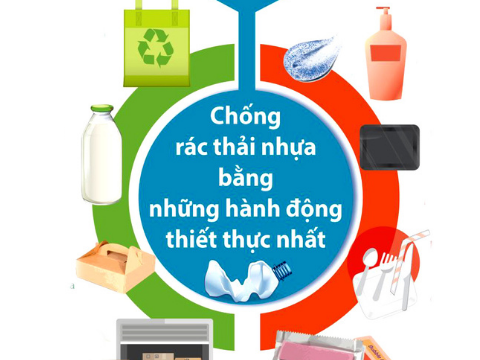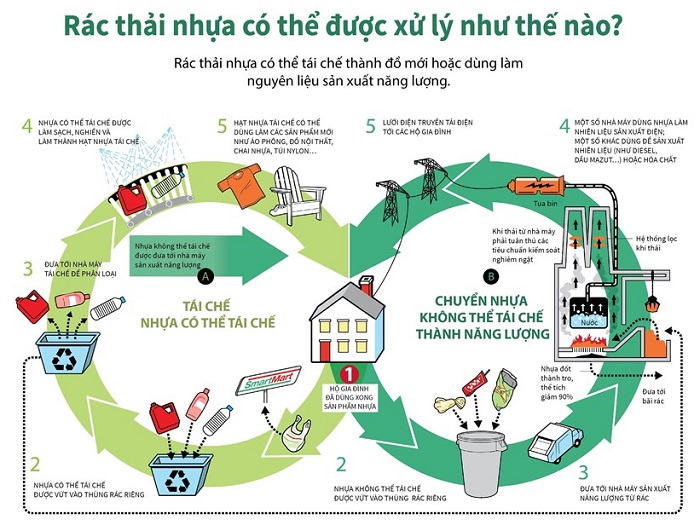Strengthen the management, reuse, recycling, treatment and reduction of plastic waste
The directive states that plastic pollution is becoming one of the biggest challenges facing countries. Each year, the amount of plastic waste generated by humans on a global scale is enough to cover four times the surface of the earth, of which 13 million tons of plastic waste are dumped into the ocean. The overuse of plastic products, especially non-biodegradable plastic bags and disposable plastic products, has been causing serious consequences for the environment. The problem of plastic pollution, especially ocean plastic pollution, is a really alarming problem that has been and will cause great damage to the ecological environment in our country.
Recognizing its role in solving the global plastic waste crisis, Vietnam, a responsible member of the United Nations, has committed to taking strong action to reduce plastic waste to protect the environment. marine and ocean ecology. In 2017, Vietnam officially joined the list of 127 countries that passed the United Nations Environment Council Resolution of the United Nations Environment Program on plastic waste and ocean microplastics. In 2018, at the G7 Summit held in Canada, the Prime Minister pledged to act as well as call for global cooperation in solving the problem of marine plastic waste. In 2019, the Prime Minister launched a nationwide movement against plastic waste, many agencies, organizations, localities, businesses and individuals have taken many practical, meaningful and effective actions to prevent plastic waste. combat, reduce plastic waste.
Do not use disposable banners, bottles, cups, bowls, plastic chopsticks… in the office
In order to continue to increase the efficiency of activities of management, treatment, reuse and recycling of used plastics, and to reduce plastic waste emissions into the environment, the Prime Minister instructed ministers and heads of state to ministerial-level agencies, Governmental agencies, People’s Committees of provinces and centrally run cities shall issue directives or plans to reduce, classify, collect, reuse, recycle and treat waste. plastics in industries, fields and management areas (completed before October 30, 2020); which directs and requires state agencies and affiliated public non-business units to perform a number of specific activities as follows:
Be exemplary, active and at the forefront of plastic waste reduction; minimize the use of single-use plastic products (including non-biodegradable nylon bags, food plastic packaging, plastic bottles, straws, foam food containers, cups and tableware… ); do not use disposable banners, slogans, bottles, cups, straws, bowls, chopsticks… in the office and during conferences, seminars, meetings and holidays, anniversaries and other events. other lawsuits; prioritize the selection of recycled, environmentally friendly products.
Pioneering and exemplary in classifying waste at the source right at the office, arranging trash cans to classify waste at agencies and units; plastic waste and other recyclable waste must not be mixed with organic waste; encourage the development and implementation of model models to serve as a basis for replication for agencies and units in the fields and areas under their management.
Carrying out communication and training to raise awareness for civil servants, public employees and employees in agencies and units on the classification, collection and reduction of plastic waste; coordinate with relevant organizations and individuals in mobilizing people to limit or not use single-use plastic products to protect the environment.
Treat waste and plastic waste as resources
The Prime Minister instructed the Ministry of Natural Resources and Environment to complete the solid waste management regulations in the draft Law on Environmental Protection (amended) in the direction of considering waste and plastic waste as resources; promote the development of circular economic models; well implement the reduction, classification of waste at source, collection, reuse, recycling and treatment of waste (including plastic waste). Develop technical documents to guide waste segregation at source. Research and propose mechanisms to limit production and consumption and have a roadmap to ban the production and consumption of a number of single-use plastic products.
Research and build environmental technical barriers for products and goods containing microplastics, nanoplastics and plastic bags to prevent adverse effects on human health and the ecological environment; research and propose a roadmap to ban the use of microplastics in the production of cosmetics, clothing, and fertilizers… Issuing environmental technical regulations and standards for recycled plastic products and goods ensure environmental protection requirements. Review and continue to improve the legal regulations on eco-labels for environmentally friendly plastic bags and plastic products with a certain recycled content.

The Ministry of Natural Resources and Environment shall assume the prime responsibility for, and coordinate with the Ministry of Industry and Trade in, organizing statistics and periodical statistics and classification of plastic materials used in production, consumption and plastic waste; building a nationwide database on plastic use and waste; conduct studies on the current situation, generation trends and management of plastic waste. Formulate and submit to the Prime Minister a project to establish a centralized recycling industrial park in accordance with law to form a recycling industry and market.
Strictly comply with regulations on import of plastic scrap in accordance with the law on environmental protection; Only import plastic scraps as raw materials for the production of products and goods (excluding commercial recycled plastic beads), except for cases where the project has been approved for investment policy and issued with a certificate. Investments and operating production facilities are allowed to import scrap plastic to produce commercial recycled plastic beads until the end of December 31, 2024. No permits are granted to establishments to import scrap just for preliminary purposes. processing, processing and resale of scrap.
Formulate and effectively implement a plan on propaganda and communication to raise public awareness on the reduction, classification, collection, recycling and treatment of plastic waste; forming people’s awareness and habits on reducing and classifying plastic waste; discovering, disseminating and awarding environmental awards for models, solutions and initiatives on reducing, classifying, collecting, recycling and treating plastic waste; building an electronic portal to share information and knowledge about plastic waste; research and put criteria to reduce, classify and collect plastic waste in the assessment and ranking of results of environmental protection activities of localities.
Socialize and improve the role of communities and businesses in reducing plastic waste emissions, classifying, collecting, recycling, and treating plastic waste; expanding forms of incentives and support to organizations and individuals that produce, distribute, promote and consume plastic products and plastic bags with green labels; building, implementing and completing the database on registration, declaration and management of the production and use of products containing plastic waste and plastic bags; strengthen communication, deploy, replicate, and effectively apply models of reducing, classifying and collecting plastic waste and plastic bags at tourist sites and resorts, especially places and tourist areas. calendar associated with water source…
Increase tax rates on plastic bags, packaging and other plastic products
The Ministry of Finance studies and submits to competent authorities to amend and supplement the Law on Environmental Protection Tax in the direction of expanding taxable objects and increasing tax rates for plastic bags, packaging and other plastic products; study and propose tax on virgin plastics; direct the inspection and prevention of environmental protection tax evasion, especially for plastic bags.
The Ministry of Finance shall assume the prime responsibility for, and coordinate with the Ministry of Natural Resources and Environment in, researching and proposing financial policies to promote and encourage waste recycling and plastic waste recycling activities; incentives and support for environmentally friendly plastic bags, recycled plastic products and environmentally friendly materials. Research and develop priority criteria or norms for public procurement for recycled and environmentally friendly products.
The Ministry of Industry and Trade directs the implementation of the goal of “Continuing to promote and soon implement the Plan to realize the target by 2021 that shops, markets and supermarkets in urban areas do not use single-use plastic; By 2025, the whole country will not use single-use plastic. Researching and promulgating regulations on standards and technical regulations on quality and design of plastic products to ensure recycling and reuse; regulate the minimum percentage of recycled plastic content in plastic products, durability and publicize information on the durability of plastic products; develop guidelines on sustainable production and consumption of plastic products. To promulgate standards and technical regulations on the quality of recycled plastics and hazardous additives in plastic materials.
The Ministry of Agriculture and Rural Development develops and implements a plan to reduce, collect and recycle plastic waste in the cultivation, animal husbandry and aquaculture industries; implement solutions to limit the use of foam floats in the fisheries sector (to float fish cages); develop and implement solutions to recover fishing gear such as nets, buoys lost, forgotten or discarded at sea (ALDFG) and recover packages of pesticides and fertilizers; prepare raw materials for products to replace non-biodegradable plastic bags and disposable plastic products from agricultural products.
The Ministry of Health directs the implementation of the plan to classify and reduce plastic waste in hospitals and medical facilities; direct and guide the classification of waste at hospitals and medical facilities; put the content of reducing plastic waste as a criterion for evaluating green, clean and beautiful medical facilities. Promulgating quality standards and hygiene requirements for recycled plastic products used as food packaging, bottled water…
The Ministry of Education and Training develops and implements a plan on waste classification and reduction of plastic waste in schools, educational and training institutions; develop content to integrate into educational activities on waste classification at source for pupils and students; put the content of waste classification and reduction of plastic waste into a green – clean – beautiful – safe school evaluation criteria.
The Ministry of Science and Technology promotes innovation, creativity, research and technology transfer for the production of environmentally friendly materials in order to replace plastic in production and business such as: biodegradable plastic materials in the country marine, bioplastic materials, application of technology using cellulose, replacing plastic materials with paper; promote and support scientific and technological research tasks related to plastic waste recycling and treatment; appraise national technical regulations related to plastic waste recycling and treatment.

The Ministry of Culture, Sports and Tourism will study and supplement standards to reduce the use of single-use plastic products and non-degradable plastic bags in business establishments, tourist accommodation services and tourism services. other areas, tourist attractions, mass sports facilities, sports training and competition centers, especially in coastal areas, and offer alternatives in the guiding regulations. service tourism industry…
The Ministry of Information and Communications, Vietnam Television Station, Voice of Vietnam Radio, and Vietnam News Agency shall assume the prime responsibility for, or coordinate with relevant agencies, organizations and individuals in implementing communication and propaganda programs. on plastic waste reduction, classification, collection, recycling and treatment of plastic waste.
Building movement, coalition against plastic waste
The People’s Committees of the provinces and cities directly under the Central Government propagate and raise public awareness on reducing plastic waste emissions, classifying waste and plastic waste; coordinate with socio-political organizations and social organizations in building movements and alliances against plastic waste; mobilize people and communities to limit or not use single-use plastic products (including non-biodegradable plastic bags, food plastic packaging, plastic bottles, straws, foam food containers, cups and tableware…) to protect the environment.
Mobilize commercial centers, supermarkets, shops, people’s markets, hotels, restaurants, cafes, tourist areas and production, business and tourism establishments… in the committed area. reduce plastic waste, limit the use of single-use plastic or replace it with environmentally friendly products; do not provide free plastic bags to customers or switch from using non-biodegradable plastic bags to other environmentally friendly bags.
Research, learn from experience and implement waste classification at source; arrange or direct the arrangement of garbage collection and sorting bins and provide training and guidance on garbage classification at offices, schools, medical facilities and public areas such as airports, piers, and docks. vehicles, commercial centers, supermarkets, people’s markets, parks, squares, tourist areas, scenic spots… Enhance capacity and efficiency of solid waste collection and treatment; carry out separate collection and treatment of classified wastes (including plastic waste). Implement the collection of garbage collection service fees for small businesses at traditional residential markets.
Organize and implement technical measures to collect plastic waste in rivers, canals, canals, ditches… to limit plastic waste dumped into the ocean; conduct and socialize activities of collecting and treating plastic waste in the sea, rivers, streams and lakes and ponds in urban areas and residential areas.
Directing to strengthen the inspection of compliance with environmental protection tax policies and environmental regulations by establishments supplying plastic bags to people’s markets and small shops; strengthen inspection and strict control of craft villages and plastic recycling facilities that do not meet the requirements for environmental protection.







